Belgian children trapped in northeast Syria eligible for DNA tests
Several Belgian children are believed to be in camps run by the US-backed Syrian Democratic Forces in northeast Syria.

ERBIL (Kurdistan 24) – Belgian Deputy Prime Minister and Foreign Minister Sophie Wilmes told the country’s parliament on Tuesday that 27 children stuck in displacement camps in northeast Syria would be eligible for DNA testing.
Wilmes told a meeting of the parliament’s foreign relations committee that the tests could be carried out locally and analyzed in Belgium.
The minister said two Belgian women remain in Syria, including one with two children detained in Damascus.
Children born in Syria whose parents are proven to be Belgian could be repatriated with a temporary passport or emergency visa, she said.
“Determining what constitutes sufficient grounds for admission to Belgian territory for children born in Syria who do not have a birth certificate is a competence of the Immigration Department,” Wilmes underlined.
Ellen Samyn, an MP for the right-wing Vlaams Belang party, opposed the decision and expressed worries about repatriating children without their mothers who may be responsible for crimes in Syria.
“For the Vlaams Belang there is no place for them in our society,” she said. “They need to be prosecuted and detained in the region where they committed their crimes.”
Currently the maximum prison sentence for membership in a terrorist organization is five years, she said. “A jail sentence in Belgium would mean they would be released in a few years.”
Several Belgian children are believed to be in camps run by the US-backed Syrian Democratic Forces in northeast Syria. Around 20 have so far returned to Belgium.
Two years ago Brussels struck a deal with the Kurdistan Regional Government (KRG) to facilitate the repatriation of orphaned children of suspected ISIS members now in Syria.
Local Kurdish-led civilian authorities in northern Syria have called on foreign states to take back wives and children of ISIS fighters. So far, a number of foreign states have repatriated foreign ISIS women and children.
According to Human Rights Watch, only 25 countries are known to have repatriated any nationals from northeast Syria. Most have brought home or helped return only a token few – primarily orphans or young children, in some cases without their mothers.
Editing by Joanne Stocker-Kelly